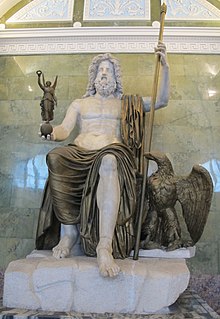Jupiter (mythology)
| Jupiter | |
|---|---|
| Member of the Archaic and Capitoline Triads | |
 A marble statue of Jupiter from c. 100 AD[a] | |
| Other names | Jove |
| Venerated in |
|
| Abode | Rome |
| Symbol | Lightning bolt, eagle, oak tree |
| Personal information | |
| Consort | Juno |
| Children | Mars, Vulcan, Bellona, Juventas |
| Parents | Saturn and Ops[source?] |
| Siblings | Roman tradition: Juno, Ceres, Vesta Greco-Roman: Pluto and Neptune |
| Greek equivalent | Zeus |
Jupiter (Latin: Iuppiter) is the king of the gods in Roman mythology.[1][2][3] He was the god of the sky and thunder.[1] His two brothers were Pluto and Neptune, and his sister was Ceres.
Life of Jupiter[change | change source]
Saturn, who was the previous king of the gods,[1] began to swallow the children that he had with his wife Ops (Greek equivalent Rhea), when they were born.[1][3] This was because he had been warned that one of his children would overthrow him.[1][3] Saturn swallowed the children Neptune, Pluto, Ceres, Juno and Vesta.[3] When Ops realized that she was pregnant with Jupiter, she had the baby secretly and moved to Crete,[1][3] giving a stone wrapped in baby clothes to Saturn for him to eat.[3] Saturn believed he had eaten Jupiter.
Overthrowing Saturn[change | change source]
After Jupiter was raised by his mother, his destiny was to overthrow Saturn, as revenge for all he had done to his brothers and sisters in the past. When Jupiter grew up, he made Saturn vomit up all of the children he had swallowed.[3] All the brothers and sisters joined forces and overthrew Saturn.[1][2][3]
Battle of the Titans[change | change source]
Then, with the help of the Cyclopes and the Hundred-handed Giants, they declared war on Saturn and the other Titans.[1][3] Jupiter finally defeated the Titans and they were imprisoned in Tartarus.[1][3]
Dividing the universe[change | change source]
Jupiter and his brothers divided the universe into three parts, Jupiter obtaining the heavens, Neptune the sea and Pluto the underworld. This is how Jupiter became the king of the gods.[1]
Related pages[change | change source]
- Tinia - Etruscan mythology equivalent to Jupiter
- Zeus - Greek mythology equivalent to Jupiter
- Odin - Norse mythology equivalent to Jupiter
Notes[change | change source]
References[change | change source]
- ↑ 1.00 1.01 1.02 1.03 1.04 1.05 1.06 1.07 1.08 1.09 Harvey, Paul (1937). The Oxford Companion to Classical Literature. London: Oxford University Press.
- ↑ 2.0 2.1 Pascal, Paul (1978). "Jupiter". World Book Encyclopedia. World Book-Childcraft International, Inc. p. 164.
- ↑ 3.00 3.01 3.02 3.03 3.04 3.05 3.06 3.07 3.08 3.09 Souli, Sophia (1998). Greek Mythology. Techni S.A. ISBN 9605402661.
